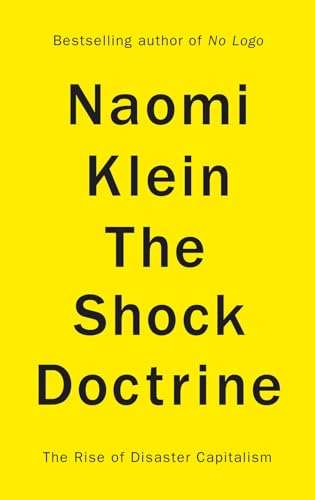Published by ALLEN LANE, 2007, softcover, index, 558 pages, condition: very good.
In her ground-breaking reporting from Iraq, Naomi Klein exposed how the trauma of invasion was being exploited to remake the country in the interest of foreign corporations. She called it "disaster capitalism." Covering Sri Lanka in the wake of the tsunami, and New Orleans post-Katrina, she witnessed something remarkably similar. People still reeling from catastrophe were being hit again, this time with economic "shock treatment" losing their land and homes to rapid-fire corporate makeovers. The Shock Doctrine retells the story of the most dominant ideology of our time, Milton Friedman's free market economic revolution. In contrast to the popular myth of this movement's peaceful global victory, Klein shows how it has exploited moments of shock and extreme violence in order to implement its economic policies in so many parts of the world from Latin America and Eastern Europe to South Africa, Russia, and Iraq. At the core of disaster capitalism is the use of cataclysmic events to advance radical privatization combined with the privatization of the disaster response itself. By capitalizing on crises, created by nature or war, Klein argues that the disaster capitalism complex now exists as a booming new economy, and is the violent culmination of a radical economic project that has been incubating for fifty years.
This was a very illuminating work about how chaotic situations are used, and sometimes created, as cover for the imposition of drastic economic and political reorganization in vulnerable economies. The end product of these actions is a so-called free market model as advocated by the Chicago School of Milton Friedman and his acolytes. Examples used include Chile, China, Argentina, Bolivia, South Africa, Russia, among others. The technique is for western financial powers to swoop in during a time of financial crisis and refuse to lend a struggling nation any money until that nation agrees to a radical reworking of its economy. This reworking is done in a shock, with many changes instituted all at once, with little or no warning. These changes, as they are draconian toward the lower classes, usually need to be accompanied by severe political repression in order to enforce the transition. What we see here is the mechanism of a growing form of corporatist colonialism. Klein parallels her examination of the stresses endured by many national economies with a look at actual, literal, personal shock treatment. In the 1950s a researcher named Ewan Cameron did research on his theory that instead of Freudian therapy a more effective method of treating mental illness was to erase the patients personality using electric shocks. Then the blank page would be receptive to reconstruction by the good doctor. The shocks caused amnesia and extreme regression. Cameron devised a new tool, one that applied six shocks at once, and even used a wide range of drugs to disorient and wipe clean as much of the patients personality as possible. Once the subject was reduced to a vegetative state, Cameron played them tapes dozens, maybe hundreds of times over. The CIA took note and launched a program of its own.
She posits a parallel between treatments that serve to erase personality with the economic and political shocks that struggling nations are forced to endure, shocks that are part and parcel of the move from a developmentalist economy, one that seeks local control and self-sufficiency, to a globalist economy, one in which foreign investment in and ownership of local enterprise is encouraged.
While I found that at times Klein extended her discourse beyond the reach of her material, her analysis of the subject matter is compelling, her linkage of different forms of shock (personal, political, economic) illuminating, and the applicability of her work to the current economic disruptions frightening. Despite its subject matter, this a compelling, and relatively fast read. It should be mandatory reading for anyone concerned with politics, economics, world affairs or current events.

